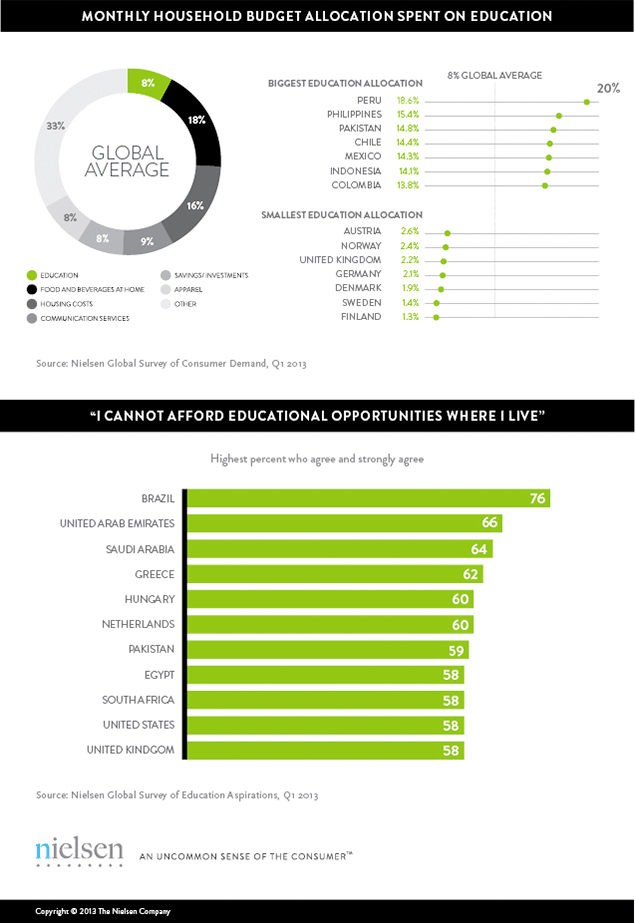Education is an Investment for the Future Around the Globe
September 12, 2013
![]() The road to better jobs, more money and improved lifestyles is paved by education, according to a new Nielsen survey. More than three-quarters (78%) of global online respondents agreed that receiving a higher education, such as college, is important. Likewise, three-fourths also believed that better employment (75%) and higher income (72%) are accessible because of educational opportunities.
The road to better jobs, more money and improved lifestyles is paved by education, according to a new Nielsen survey. More than three-quarters (78%) of global online respondents agreed that receiving a higher education, such as college, is important. Likewise, three-fourths also believed that better employment (75%) and higher income (72%) are accessible because of educational opportunities.
The Nielsen Global Survey of Education Aspirations polled more than 29,000 Internet respondents in 58 countries to measure consumer sentiment on the availability of educational opportunities at all levels of study and the resulting opportunity for job and salary advancement. While the opportunity to receive a quality education is a multi-dimensional topic with underlying socio-economic factors to consider, the findings help shed light on what the future holds for both consumers and companies alike in the context of driving innovation, economic advancement and social development.
“Investing in education is critical to fostering growth and innovation for generations to come,” said Susan Whiting, vice chair at Nielsen. “The head-spinning pace of technological change is creating new opportunities—and presenting new challenges. Improving our children’s education is the surest way to ensure a brighter future.”
Disconnect Between Desire and Dollars
The vast majority of respondents said they value education, and Latin Americans were among the most ardent supporters. More than 90 percent of respondents in Brazil (94%), Mexico (92%), Chile (92%) and Venezuela (91%) said they believe that higher education was vital. Only one-quarter (23%) of global respondents believe that finishing secondary education was good enough.
But education costs can be a barrier to entry. According to the Nielsen survey, education costs comprised 8 percent of global monthly budget allocations, on average, which is among the top four household expenses, ranking after food and beverages (18%), housing (16%) and phone/Internet services (9%). Monthly spending on education expenses exceeded the global average in many developing countries across Latin America, Asia-Pacific and the Middle East/Africa regions. Respondents in Peru, the Philippines, Pakistan, Chile, Mexico, Indonesia and Colombia said they allocate 14 percent or more of their monthly budget to education expenses.
Conversely, due largely to subsidized education programs, many European respondents said they allot the least amount to monthly spending on education, with Finland, Sweden, Denmark, Germany, U.K. and Norway allocating 2 percent or less of their monthly budget to education costs.
Half of respondents around the world said they simply could not afford an education where they lived, with more than three-quarters of Brazilians (76%) at the top of the list, followed by respondents in the United Arab Emirates (66%) and Saudi Arabia (64%).

Other findings include:
Education leads to upward mobility.
Corporate support for education initiatives is a winning proposition.
Worldwide confidence in educational programs is strong.
Courtesy of Nielsen






























